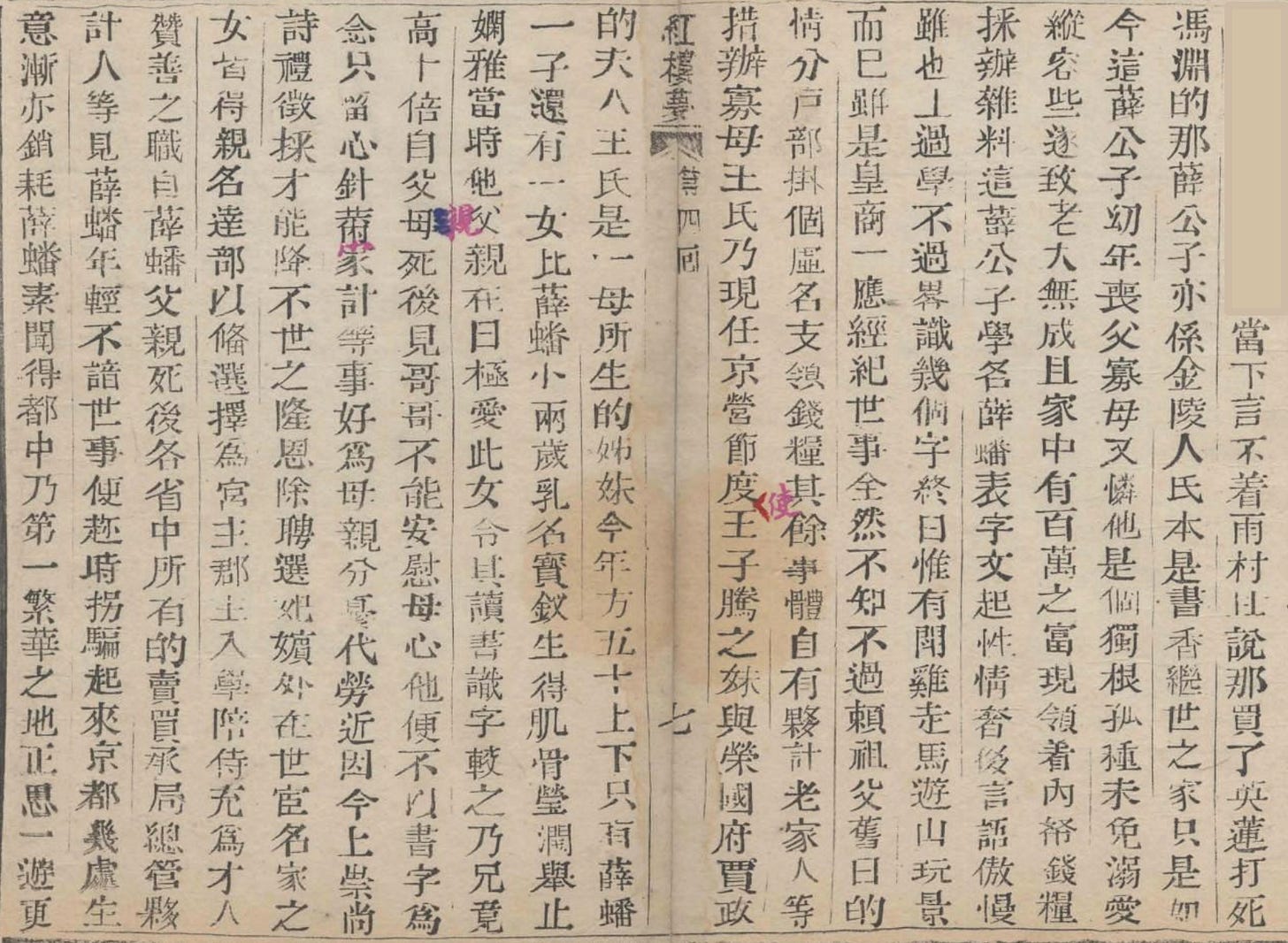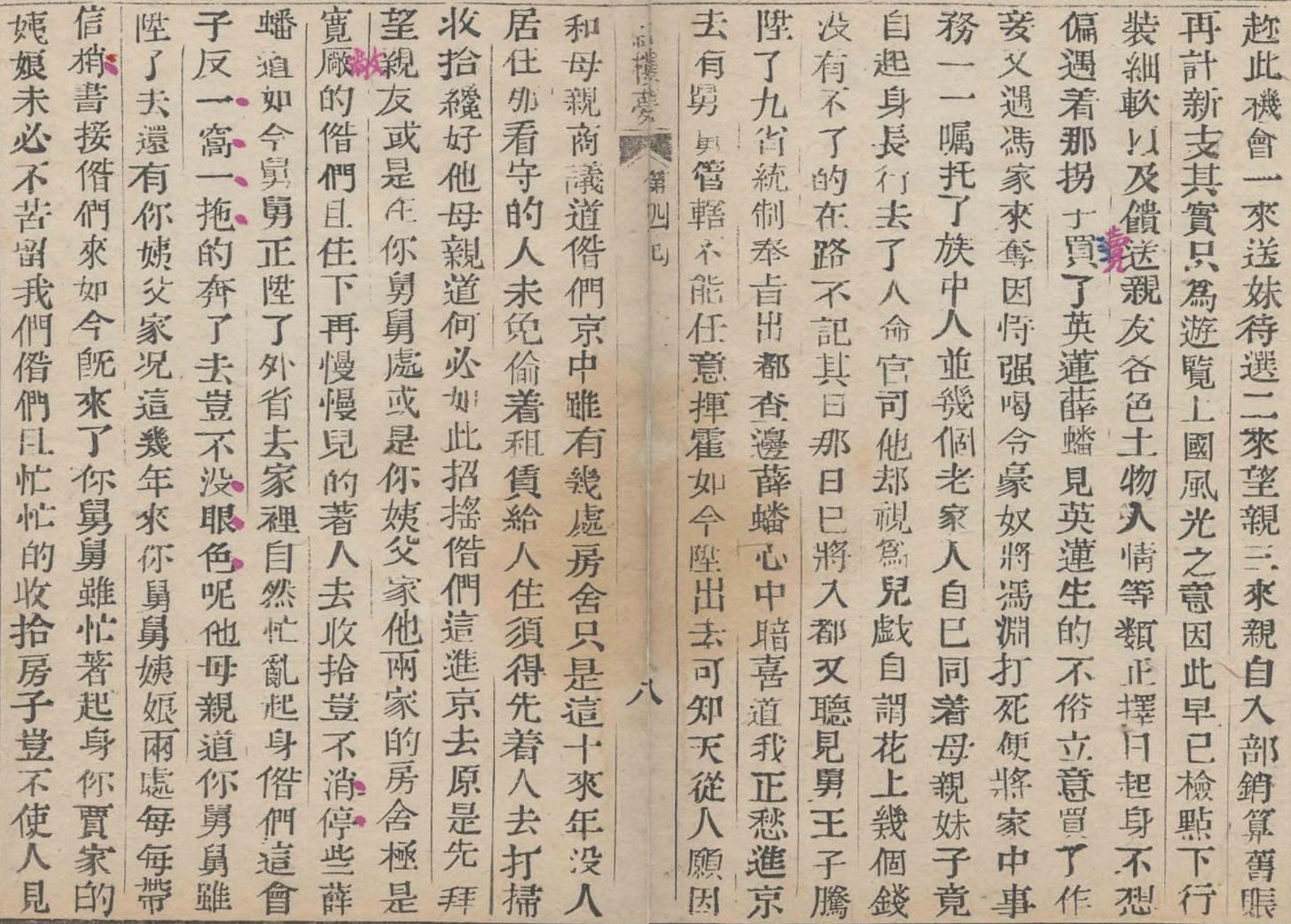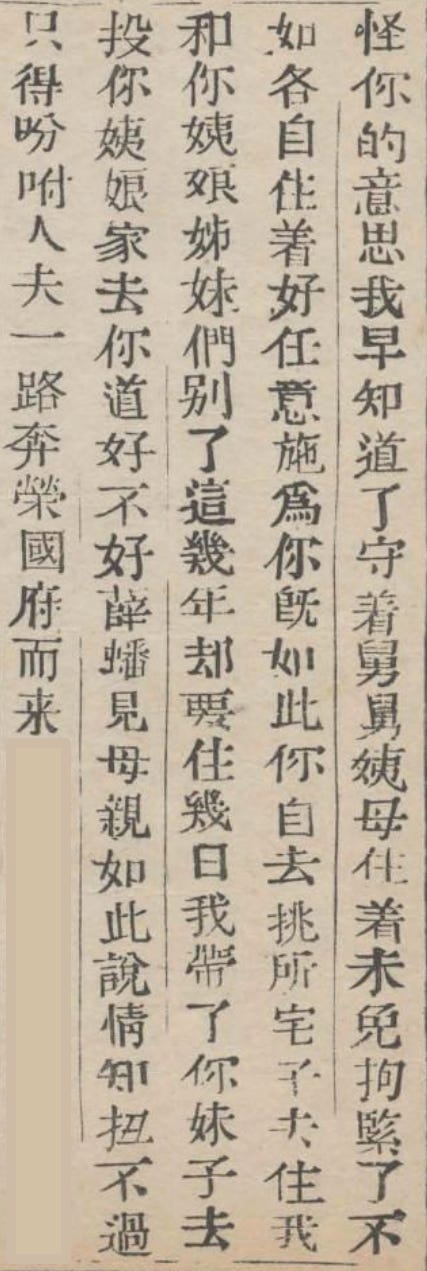The Murderer Heads to the Capital
This is kind of a long section, but it’s not as bad as you think. It seems at first glance that we’re supposed to learn more about Xue Pan here. However, the real purpose of this section is to introduce us to Xue Baochai, the famous “third wheel” in the Jia Baoyu – Lin Daiyu relationship. As is the case with so many other characters in this book, Xue Baochai excells and stands out in ways that the remaining man in her family does not.
My Translation
That’s enough about Yucun for now.
The young Mr. Xue, who purchased Yinglian and had Feng Yuan beaten to death, was also a native of Jinling. He was born into a family of scholarly officials that had flourished for generations. However, his father had died young. His mother doted on him as the sole heir and the last of his line, and inevitably indulged him to excess. As a result, he grew into a man of few accomplishments.
Now, his family was worth millions, and held a commission from the Imperial Treasury to procure official goods. And so this young Mr. Xue, whose formal name was Xue Pan and whose courtesy name was Wenqi, was extravagant and proud by nature. Though he had attended school, he had barely learned a few characters. He spent his days instead on cockfighting, horse racing, and idle excursions through mountains and rivers.
Though he was officially a merchant supplying the Imperial Household, Xue Pan didn’t know anything about practical business matters. He relied entirely on the lingering influence of his ancestors, holding an empty title in the Ministry of Revenue to draw funds and stipends. All actual affairs were managed by clerks and old family retainers.
His widowed mother, from the Wang family, was the sister of the current Capital Garrison Commander Wang Ziteng and the full blooded sister of Lady Wang, the wife of Jia Zheng from the Rongguo Mansion. Now just approaching 50, she only had Xue Pan as her son. She also had a daughter two years younger than Xue Pan named Baochai. Baochai’s shining skin and graceful demeanor radiated her refinement. While her father was alive, she had been his cherished child. He had taught her to read, making her ten times more cultivated than her brother.
After her father passed away, Baochai noticed that her brother did nothing to comfort their mother. And so she put aside her literary pursuits and devoted herself to needlework and household management, seeking to share her mother’s burdens.
The present Emperor valued cultivation and sought talented individuals. And so he bestowed extraordinary favor by decreeing that the daughters of distinguished official families, in addition to imperial consorts, should have their names registered at the Ministry of Education for potential selection as companions to princesses and noble ladies in their studies, serving as talented female instructors.
Since the death of Xue Pan’s father, and since Xue Pan was young and inexperienced, the managers and clerks of the Xue family’s provincial trade offices began to embezzle funds. Gradually, even their business in the capital began to decline.
Now, Xue Pan had heard for a long time about the prosperity of the capital, and had always wanted to visit. The opportunity had arisen: he could take his sister to the imperial selection, visit some relatives, personally settle old accounts, and petition for new funds from the ministry. The truth, though, is that he only wanted to do some sightseeing in the glorious capital.
He had already prepared his lugage, some valuables, and assorted gifts for relatives, and had finalized his departure date when he met the human trafficker who was reselling Yinglian.
Xue Pan saw that Yinglian was remarkably beautiful and wanted to purchase her as a concubine. When the Feng family intervened, he forcefully ordered his brutish servants to beat Feng Yuan to death.
After arranging with distant family members to have his domestic affairs taken care of, he left with his mother and sister without a second thought. He treated the murder case as if it were a child’s game, reassuring himself that anything could be settled with enough money.
They journey for a few days. As they approached the capital, news arrived that Xue Pan’s uncle Wang Ziteng had been promoted to the Nine Provinces Military Commissioner position and that he had been ordered to inspect the frontier regions. “I was just worrying that uncle’s presence in the capital would curb my spending,” thought Xue Pan to himself with delight. “Heaven has granted me my wish!”
And so he spoke with his mother. “Though we own several residences in the capital,” he told her, “nobody has occupied them for the last decade or so. The caretakers have likely been renting them out secretly. We should send servants ahead to clean them and get them ready.”
“Why make such a fuss?” his mother replied. “We ought to visit our relatives first when we go to the capital. We can stay at your uncle’s house or your aunt’s house. Both of them have large estates. Let’s settle there first, and then we can gradually send servants over to prepare our homes. Wouldn’t that be a bit more discreet?”
“Uncle was just promoted to a provincial post,” replied Xue Pan. “His household must be in chaos while he prepares to depat. Wouldn’t it be inconsiderate for us to barge in with our whole group?”
“Even if your uncle has been promoted, there’s still your aunt’s family,” replied his mother. “Besides, your uncle and aunt have sent us letters for years asking us to visit. Now that we’re here, even if your uncle is busy with his duties, your aunt will certainly insist that we stay with her. Wouldn’t it seem discourteous of us if we quickly settled our own residence instead?
“I understand what you’re concerned about. Living with your uncle or aunt would constrain you, while living separately would give you freedom. Fine – choose a house for yourself. I’ve been apart from your aunt for all these years, and want to spend a few days with her. Your sister and I will stay with your aunt. Is that okay with you?”
When Xue Pan heard his mother say this, he knew he had no other choice. He ordered the servants to start for the Rongguo Mansion.
Translation Critique
Hawkes
Hawkes’ translation of the sentence starting with “近因今上崇尚詩禮” is a bit overly formal and doesn’t seem to fit in with the book: “The well-known interest always shown by our present sovereign in literature and arts, and the widespread recruitment of talent that this has stimulated, had recently, at the time of which we speak,” and so on and so forth. It’s a single run-on sentence that takes 11 lines and feels like something taken from a different text altogether.
The problem is that Hawkes is likely wrong in his translation. 今 (today) in that sentence might not be a reference to Cao Xueqin’s day, which Hawkes implies, but rather a reference in time to the fictional time of the book. And there’s no reason to translate the whole thing into one long and formal sentence, especially since there’s nothing unusually formal about it in Chinese.
Hawkes is consistent with the original in numerating the reasons Xue Pan wanted to go to the capital: the Chinese text does contain reason one, reason two, and reason three. However, there’s really no reason to translate this as formally and stiffly as Hawkes does.
Bagatelle means a trifle or an insubstantial thing. It’s a perfectly good French word.
Hawkes also refers to Wang Ziteng’s promotion to “C.-in-C. Northern Provinces.” C in C likely means “Commander in Chief,” which, of course, has completely different implications for modern American audiences.
Hawkes also has Xue Pan’s mother ask him whyever, an emphatic form of “why” that almost never shows up in conversation. This is utterly bizarre considering how casual the conversation is in Chinese: notice the constant use of 咱們 and other casual phrases.
Yang
The Yangs describe Xue Pan as a “Court Purveyor,” which means somebody who had a contract to make purchases for the royal family.
Otherwise, the Yang translation is actually quite accurate, and reflects the original text nicely.
Chinese Text
當下言不著雨村。且說那買了英蓮打死馮淵的那薛公子亦系金陵人氏,本是書香繼世之家。只是如今這薛公子幼年喪父,寡母又憐他是個獨根孤種,未免溺愛縱容些,遂致老大無成。且家中有百萬之富,現領著內帑錢糧,採辦雜料。這薛公子,學名薛蟠,表字文起,性情奢侈,言語傲慢;雖也上過學,不過略識幾個字,終日惟有鬥雞走馬,遊山玩水而已。雖是皇商,一應經紀世事全然不知,不過賴祖父舊日的情分,戶部掛個虛名,支領錢糧,其餘事體自有夥計老家人等措辦。寡母王氏乃現任京營節度使王子騰之妹,與榮國府賈政的夫人王氏是一母所生的姊妹,今年方五十上下,只有薛蟠一子。還有一女比薛蟠小兩歲,乳名寶釵,生得肌骨瑩潤,舉止嫻雅。當時他父親在日,極愛此女,令其讀書識字,較之乃兄竟高十倍。自父親死後,見哥哥不能安慰母心,他便不以書字為念,只留心針黹家計等事,好為母親分憂代勞。近因今上崇尚詩禮,徵採才能,降不世之隆恩,除聘選妃嬪外,在世宦名家之女,皆得親名達部,以備選擇為公主郡主入學陪侍,充為才人贊善之職。自薛蟠父親死後,各省中所有的買賣承局總管夥計人等,見薛蟠年輕,不諳世事,便趁時拐騙起來,京都幾處生意漸亦銷耗。
薛蟠素聞得都中乃第一繁華之地,正思一遊,更趁此機會,一來送妹待選,二來望親,三來親自入部銷算舊賬,再計新支,其實只為遊覽上國風光之意。因此,早已打點下行裝細軟以及饋送親友各色土物人情等類,正擇日起身,不想偏遇著那柺子重賣英蓮。薛蟠見英蓮生得不俗,立意買了作妾,又遇馮家來奪,因恃強喝令豪奴將馮淵打死。便將家中事務一一囑託了族中人並幾個老家人,自己同著母親妹子竟自起身,長行去了。人命官司,他卻視為兒戲,自謂花上幾個錢,沒有不了的。
在路上不計其日。那日已將入都,又聽見母舅王子騰昇了九省統制,奉旨出都查邊,薛蟠心中暗喜道:「我正愁進京去有舅舅管轄,不能任意揮霍;如今升了出去,可知天從人願!」因和母親商議道:「咱們京中雖有幾處房舍,只是這十來年沒人居住,那看守的人未免偷著租賃給人住,須得先著人去打掃收拾才好。」他母親道:「何必如此招搖?咱們這次進京去,原該先拜望親友,或是在你舅舅處,或是你姨父家。他兩家的房舍極是寬敞的,咱們且住下,再慢慢兒的著人去收拾,豈不消停些?」薛蟠道:「如今舅舅正升了外省去,家裡自然忙亂起身,咱們這會子反一窩一拖的奔了去,豈不沒眼色呢?」他母親道:「你舅舅雖升了去,還有你姨父家。況這幾年來,你舅舅姨娘兩處每每帶信捎書接咱們來。如今既來了,你舅舅雖忙著起身,你賈家的姨娘未必不苦留我們。咱們且忙忙的收拾房子,豈不使人見怪?你的意思,我早知道了:守著舅舅姨母住著,未免拘緊了,不如各自住著,好任意施為。既然如此,你自去挑所宅子去住;我和你姨娘姊妹們別了這幾年,卻要廝守幾日。我帶了你妹子投你姨娘家去,你道好不好?」薛蟠見母親如此說,情知扭不過,只得吩咐人夫,一路奔榮國府而來。
Translation Notes
內帑 (nèitǎng) is the Imperial Treasury, referring particularly to the Emperor’s private funds.
雜料 means miscellaneous things. It’s not entirely clear what the Xue family was purchasing on behalf of the Imperial Treasury, though it probably involved rare or luxurious goods.
皇商 literally means an “imperial merchant.” It’s obvious from the context here that he’s a merchant supplying goods to the Imperial Household.
戶部 was the Imperial Ministry of Revenue. Xue Pan held a 虛名, or an empty (i.e. nominal) position there.
節度使 means a regional military governor – a title that stretches back to the Tang dynasty.
瑩潤 means “white and shiny,” and refers to Baochai’s delicate complexion.
諳 means to be well versed in or to be fully acquainted with
揮霍 means to spend freely or squander money
招搖 means to show off or draw attention to yourself.
消停 actually means peaceful or quiet; it’s contrasted here with 招搖, which is why I translated it as “discreet.” You can also think of Xue Pan’s mother as saying something like “it would be more convenient for us to move more slowly.”





